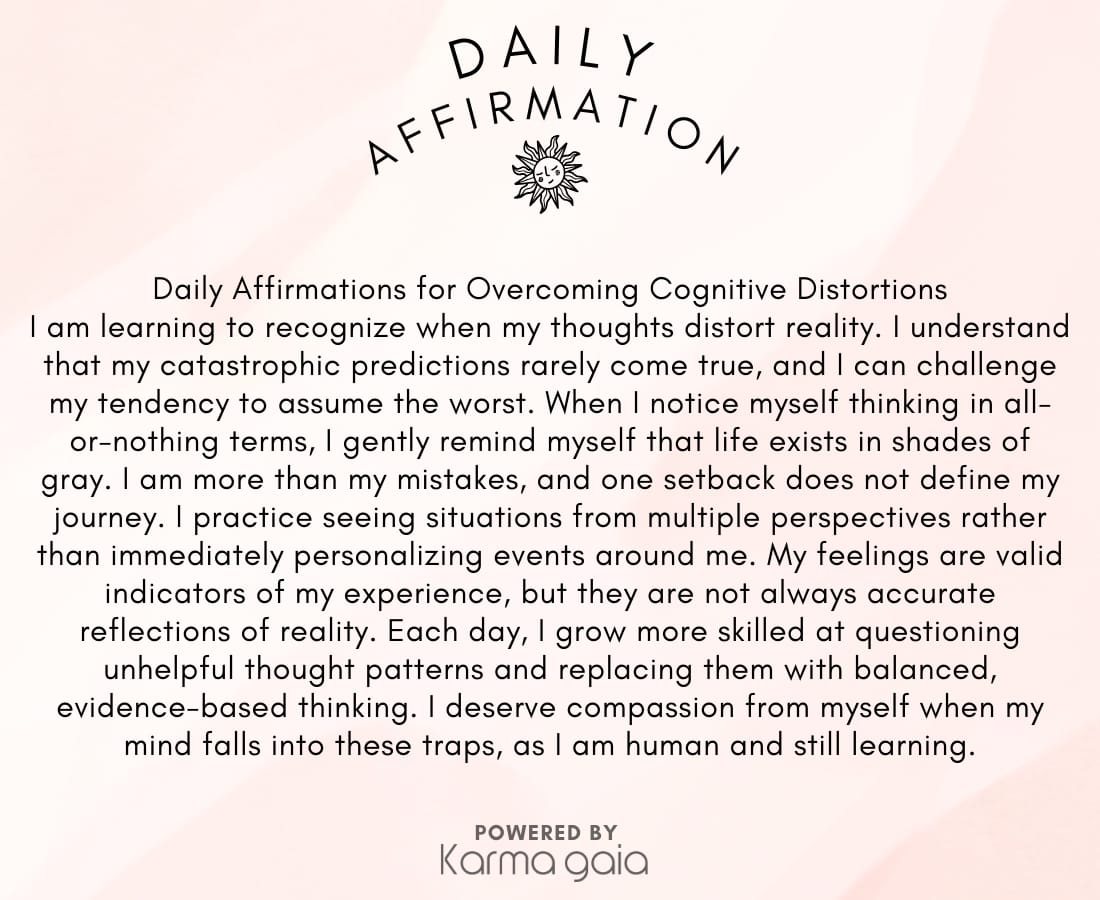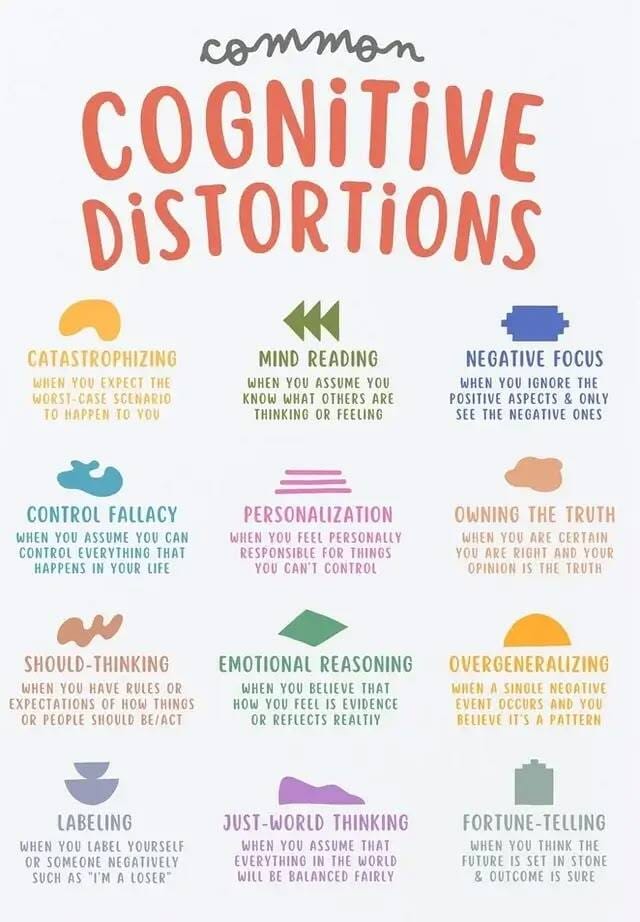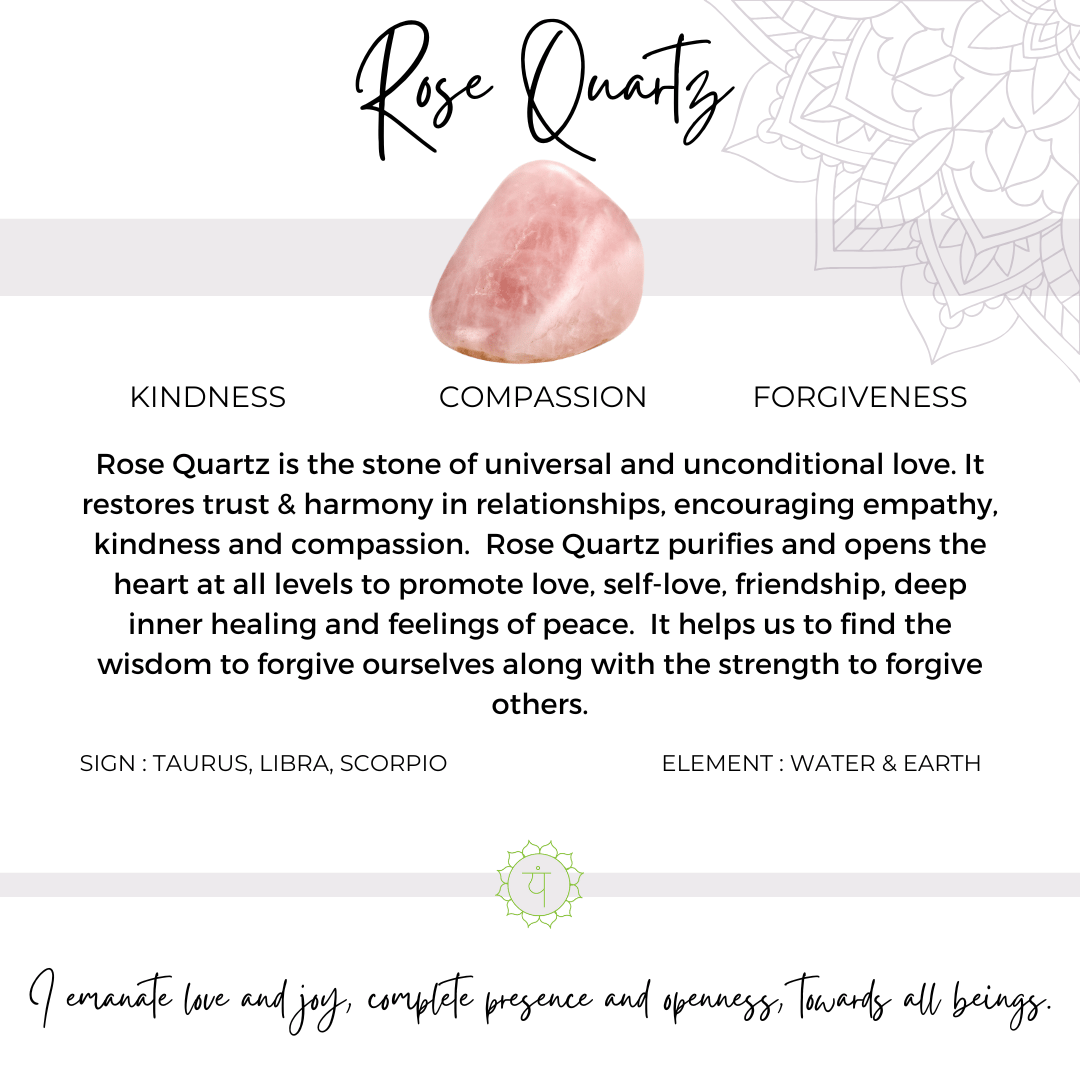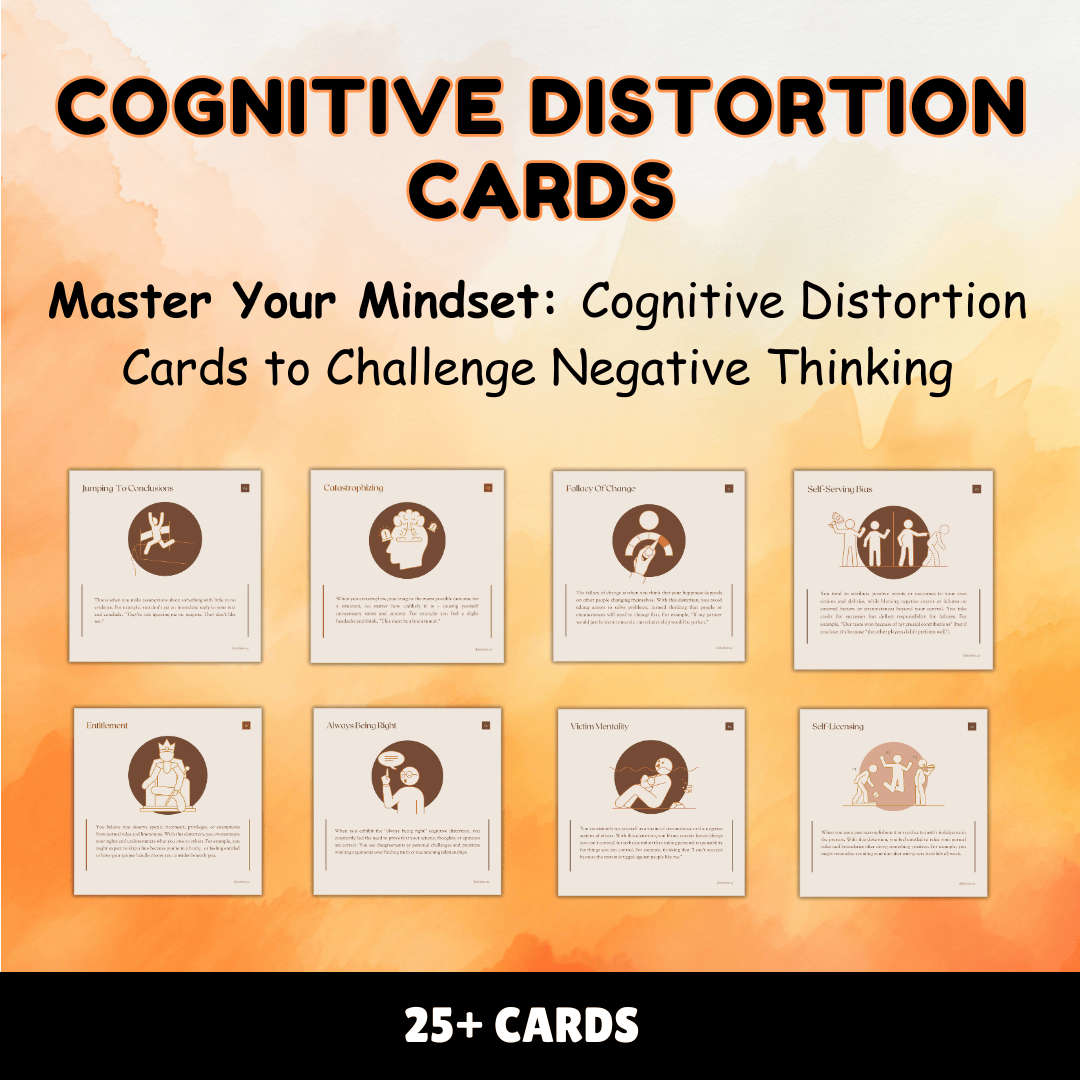- Karma Gaia
- Posts
- 10 Common Cognitive Distortions
10 Common Cognitive Distortions
The 10 Most Common Cognitive Distortions and How to Challenge Them...
Thought of the day…
"Happiness is not the absence of cognitive distortions, but the ability to dance with them. Our minds will always create illusions—catastrophizing small setbacks, personalizing random events, filtering out positives. True contentment comes not from perfect thinking, but from recognizing these patterns with gentle awareness, questioning them with curiosity rather than judgment, and choosing our response rather than being prisoner to our thoughts."
In Today's Email:
The 10 Most Common Cognitive Distortions and How to Challenge Them…
Weekly Astrology...
Meditation for Catastrophic Thinking…

IMAGE OF THE DAY

TODAY'S LEARNING
The 10 Most Common Cognitive Distortions and How to Challenge Them
Our minds are powerful tools, but sometimes they play tricks on us. Cognitive distortions—patterns of thinking that are inaccurate, biased, or otherwise unhelpful—can significantly impact our mood, relationships, and overall quality of life. Recognizing these thought patterns is the first step toward challenging and changing them. Here are the ten most common cognitive distortions and strategies to overcome them.
1. All-or-Nothing Thinking
The Distortion: Seeing situations in black-and-white terms without acknowledging the middle ground. If something isn't perfect, it's considered a complete failure.
Challenge It: Look for the gray areas. Ask yourself: "Is there a middle ground I'm not seeing?" Remember that most situations involve nuance rather than absolutes.
2. Overgeneralization
The Distortion: Taking one negative experience and applying it broadly to unrelated situations. Using words like "always," "never," or "every time" frequently signals this distortion.
Challenge It: Test your generalizations against evidence. Is it really "always" or "never," or can you find counterexamples? Replace absolute statements with more accurate ones.
3. Mental Filtering
The Distortion: Focusing exclusively on negative details while filtering out all positive aspects of a situation.
Challenge It: Intentionally identify positive elements. For each negative aspect you notice, challenge yourself to find at least two positive ones.
4. Discounting the Positive
The Distortion: Dismissing positive experiences by insisting they "don't count" for various reasons.
Challenge It: Practice accepting compliments and acknowledging achievements without minimizing them. Ask yourself how you would respond if a friend shared the same positive experience.
5. Jumping to Conclusions
The Distortion: Making negative interpretations without supporting evidence. This includes mind reading (assuming others' thoughts) and fortune telling (predicting negative outcomes).
Challenge It: Identify when you're making assumptions and seek evidence. Ask: "What facts actually support this conclusion?" Consider alternative interpretations.
6. Magnification and Minimization
The Distortion: Exaggerating the importance of negative events or shortcomings while downplaying positive events or strengths.
Challenge It: Use the "perspective check" technique. Ask yourself: "How important will this seem in a week? A month? A year?" This helps restore proportion.
7. Emotional Reasoning
The Distortion: Taking emotions as evidence of truth. "I feel anxious, so this situation must be dangerous."
Challenge It: Remind yourself that feelings, while valid, aren't always accurate reflections of reality. Look for objective evidence beyond your emotional state.
8. Should Statements
The Distortion: Using rigid, often unrealistic expectations with words like "should," "must," or "ought."
Challenge It: Replace "should" with more flexible language. Instead of "I should always be productive," try "I aim to be productive when I can, but rest is also important."
9. Labeling
The Distortion: Attaching a negative label to yourself or others based on specific behaviors. "I made a mistake, so I'm a failure."
Challenge It: Separate behaviors from identity. Remind yourself that actions don't define a person's entire worth. Use specific, behavior-focused descriptions instead of labels.
10. Personalization and Blame
The Distortion: Taking excessive responsibility for external events or, conversely, blaming others while denying your own role.
Challenge It: Identify all factors contributing to a situation, not just your actions or someone else's. Recognize the complexity of most situations and the limits of individual control.
Moving Forward
Challenging cognitive distortions takes practice and persistence. Consider keeping a thought journal to track distorted thinking patterns and your efforts to challenge them. Over time, you'll develop a more balanced, realistic perspective that can significantly improve your emotional well-being.
Remember that occasional cognitive distortions are normal and human. The goal isn't to eliminate them entirely but to recognize them quickly and respond with more balanced thinking. With practice, challenging these thought patterns becomes more automatic, leading to improved mental health and more fulfilling relationships.
DEAL OF THE DAY
Cognitive Distortion Cards To Challenge Negative Thinking
Limited Time: This deal expires in 60 hours.
Today's Deal: Get 80% Off- Cognitive Distortion Cards
About: Transform the way you think and feel with our Cognitive Distortion Cards—a powerful, pocket-sized toolkit designed to help you identify and challenge negative thought patterns. Each card highlights a specific distortion, clearly defines it, and offers actionable tips to reframe your perspective. Perfect for therapists, coaches, or individuals committed to personal growth, these cards encourage mindful self-reflection and foster healthier, more balanced thinking. With every shuffle and draw, you’ll learn to recognize limiting beliefs, break free from self-defeating cycles, and welcome a more positive, resilient mindset. Start your journey toward clearer thinking today!
Each card features a unique cognitive distortion, accompanied by insightful descriptions and practical strategies to counteract its effects. Whether you're a mental health professional, a student, or an individual on a journey of self-discovery, these cards are an invaluable resource for fostering self-awareness and promoting positive change.
TOGETHER WITH DIRTEA
Kickstart your morning routine
Upgrade your day with award-winning DIRTEA Coffee Super Blend. For people seeking sharper focus, a calm mind, and lasting energy:
Over 1,000mg of Lion's Mane per Cup
80% less caffeine than regular coffee
Made with the highest quality Organic Certified ingredients.
*Please support our sponsors. They help keep Karma Gaia free!
WEEKLY ASTROLOGY
As March unfolds, we enter a week centered on mental exploration. Mercury, the planetary ruler of thought, forms a mystical alignment with Neptune, deepening our connection to intuition and creative visualization. Shortly after, Mercury shifts into Aries, beginning a fresh cycle that encourages spontaneous action over prolonged deliberation. Your weekly horoscope for March 2-8, 2025, offers guidance on balancing these contrasting energies.
March 2 | Mercury Conjunct Neptune in Pisces
March 3 | Mercury Enters Aries; Moon Enters Taurus
March 5 | Moon Enters Gemini
March 7 | Moon Enters Cancer
POSITIVE NEWS OF THE DAY
Huge win for UK Beavers…
In a huge win for the rewilding movement, the UK government has approved the reintroduction of beavers to England.
Hunted to extinction around 400 years ago, the animals have been reintroduced at several sites across England, but nationwide approval had become bogged down in politics.
Now beavers are set to return and will bring many benefits, say ecologists. They have been shown to boost biodiversity and help mitigate flooding. However, some farmers object to their release on the grounds that they could flood farmland.
Tony Juniper, chair of Natural England, said their return was a “significant landmark for nature recovery in England”.
CRYSTAL OF THE DAY

SOUND HEALING
Meditation for Catastrophic Thinking
MEME



